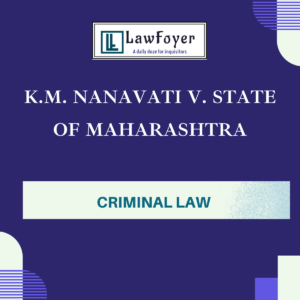A) ABSTRACT / HEADNOTE
This case revolves around the application of Section 14 of the Limitation Act, 1963, concerning the exclusion of time spent pursuing a case in a court lacking jurisdiction. The Supreme Court overruled the dismissal of the plaintiffs’ execution application for being time-barred and held that the period from 18.12.2000 to 29.01.2005, during which the plaintiffs pursued the execution before an incompetent forum, must be excluded in calculating the limitation period. The Court emphasized the principles of due diligence, good faith, and substantial justice, affirming that the plaintiffs acted without mala fide intent. Consequently, the execution application was deemed within the limitation period under Article 182 of the J&K Limitation Act.
Keywords: Limitation Act, Jurisdiction Defect, Due Diligence, Exclusion of Time, Good Faith.
B) CASE DETAILS
i) Judgement Cause Title:
Purni Devi & Anr. v. Babu Ram & Anr.
ii) Case Number:
Civil Appeal No. 4633 of 2024.
iii) Judgement Date:
April 2, 2024.
iv) Court:
Supreme Court of India.
v) Quorum:
Justice Sanjay Karol and Justice Aravind Kumar.
vi) Author:
Justice Sanjay Karol.
vii) Citation:
[2024] 4 S.C.R. 37; 2024 INSC 259.
viii) Legal Provisions Involved:
- Section 14 of the Limitation Act, 1963.
- Article 182 of the J&K Limitation Act.
- Section 48 of the Code of Civil Procedure, 1908.
ix) Judgments Overruled by the Case (if any):
N/A.
x) Case is Related to which Law Subjects:
Civil Procedure, Limitation Law, and Jurisdiction.
C) INTRODUCTION AND BACKGROUND OF JUDGEMENT
The case stems from a long-drawn property dispute originating from 1984. The plaintiffs sought the execution of a decree from 1986 that directed the defendants to deliver possession of the disputed property. The decree attained finality in 2000 following a dismissal of appeals. However, the plaintiffs initially filed an execution application before the Tehsildar, a court lacking jurisdiction, leading to dismissal in 2005. A fresh application filed in 2005 was dismissed by the Munsiff Court and upheld by the High Court on grounds of limitation. The Supreme Court adjudicated whether the time spent before the Tehsildar could be excluded under Section 14 of the Limitation Act.
D) FACTS OF THE CASE
- Origin of the Dispute: The property dispute began in 1984, leading to a decree in favor of the plaintiffs in 1986 by the Munsiff Court.
- Decree Finality: Following dismissals of appeals by the District Judge and High Court, the decree became final in 2000.
- Execution Proceedings: The plaintiffs filed for execution before the Tehsildar in 2000, which was dismissed in 2005 for lack of jurisdiction.
- Subsequent Proceedings: The plaintiffs filed a fresh execution application in 2005 with the Munsiff Court, which dismissed it as time-barred.
- Appellate Review: The High Court upheld the dismissal.
E) LEGAL ISSUES RAISED
i) Whether the period between 18.12.2000 to 29.01.2005, spent pursuing execution before an incompetent forum, should be excluded under Section 14 of the Limitation Act.
F) PETITIONER/APPELLANT’S ARGUMENTS
- Good Faith and Bona Fide Belief: The plaintiffs argued that their application before the Tehsildar was filed in good faith under the belief it had jurisdiction.
- Applicability of Section 14: They relied on precedents such as Consolidated Engineering Enterprises v. Principal Secretary, Irrigation Department ([2008] 5 SCR 1108) and M.P. Steel Corporation v. CCE ([2015] 7 SCR 291) to assert that Section 14 applies when proceedings are pursued diligently and without mala fides.
- Exclusion Principle: The exclusion of time aligns with the principle of justice and ensures no party suffers due to procedural errors.
- Precedents from J&K Law: Provisions in the Limitation Act applicable to J&K are materially similar to those in the Indian Limitation Act, supporting their argument.
G) RESPONDENT’S ARGUMENTS
- Raising Plea Late: The respondents argued that the exclusion plea was raised for the first time before the Supreme Court.
- Negligence Allegation: They alleged that the plaintiffs’ actions lacked due diligence and constituted negligence.
- Barred by Limitation: The limitation period expired since the plaintiffs failed to approach the competent court within the stipulated time.
H) JUDGEMENT
a. Ratio Decidendi
-
Conditions for Section 14 Application: The Court identified that:
- Both proceedings were civil and prosecuted in good faith.
- Failure arose from jurisdictional defect.
- Both cases related to the same decree.
-
Principles of Justice: Emphasis was placed on interpreting Section 14 liberally to advance justice and avoid penalizing procedural mistakes.
-
Rejection of Respondents’ Claims: The plea for exclusion was recorded in earlier proceedings, negating respondents’ claim of its novelty.
b. Obiter Dicta
- The judgment underscored the importance of judicial discretion in interpreting procedural laws to foster justice.
c. Guidelines Issued
- Courts should emphasize the essence of justice while adjudicating limitation-related disputes.
- A bona fide litigant must not be penalized for procedural lapses beyond their control.
I) CONCLUSION & COMMENTS
The judgment is a landmark affirmation of procedural equity. It highlights how procedural lapses, when pursued in good faith, should not extinguish substantive rights. The Court’s approach in applying Section 14 of the Limitation Act liberally ensures that justice prevails over technicalities.
J) REFERENCES
a. Important Cases Referred
- Consolidated Engineering Enterprises v. Principal Secretary, Irrigation Department ([2008] 5 SCR 1108).
- M.P. Steel Corporation v. CCE ([2015] 7 SCR 291).
- Sesh Nath Singh v. Baidyabati Sheoraphuli Coop. Bank Ltd. ([2021] 3 SCR 806).
- Laxmi Srinivasa R and P Boiled Rice Mill v. State of Andhra Pradesh (2022 SCC Online SC 1790).
b. Important Statutes Referred
- Limitation Act, 1963 – Section 14.
- J&K Limitation Act – Article 182.
- Code of Civil Procedure, 1908 – Section 48.

